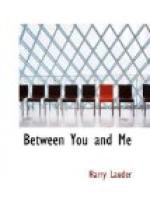I mind twa such laddies I knew once, when I was younger. Andy could ha’ his way wi’ any lassie, a’most, i’ the toon. Just so far he’d gang. Ye’d see him, in the gloamin’, roamin’ wi’ this yin and that one. They’d talk aboot him, and admire him. Jamie—he was reserved and bashfu’, and the lassies were wont to laugh at him. They thocht he was afraid of them; whiles they thocht he had nae use for them, whatever, and was a woman hater. It was nae so; it was just that Jamie was waiting. He knew that, soon or late, he’d find the yin who meant mair to him than a’ the ither lassies i’ the world put together.
And it was sae. She came to toon, a stranger. She was a wee, bonnie creature, wi’ bricht een and bright cheeks; she had a laugh that was like music in your ears. Half the young men in the toon went coortin’ her frae the moment they first clapped een upon her. Andy and Jamie was among them—aye, Jamie the woman hater, the bashfu’ yin!
And, wad ye believe it, it was Jamie hung on and on when all the ithers had gie’n up the chase and left the field to Andy? She liked them both richt weel; that much we could all see. But noo it was that Andy found oot that he’d been spending what he had wi’ tae free a hand. Noo that he loved a lassie as he’d never dreamed he could love anyone, he found he could say nowt to her he had no said to a dozen or a score before her. The protestations that he made rang wi’ a familiar sound in his ain ears—hoo could he mak’ them convincing to her?
And it was sae different wi’ Jamie; he’d ne’er wasted his treasure o’ love, and thrown a wee bit here and a wee bit there. He had it a’ to lay at the feet o’ his true love, and there was little doot in ma mind, when I saw hoo things were gae’in, o’ what the end on’t wad be. And, sure enow, it was no Andy, the graceful, the popular one, who married her—it was the puir, salt Jamie, who’d saved the siller o’ his love—and, by the way, he’d saved the ither sort o’ siller, tae, sae that he had a grand little hoose to tak’ his bride into, and a hoose well furnished, and a’ paid for, too.
Aye, I’ll no be denyin’ the Scot is a close fisted man. But he’s close fisted in more ways than one. Ye’ll ca’ a man close fisted and mean by that just that he’s slow to open his fist to let his siller through it. But doesna the closed fist mean more than that when you come to think on’t? Gie’n a man strike a blow wi’ the open hand—it’ll cause anger, maybe a wee bit pain. But it’s the man who strikes wi’ his fist closed firm who knocks his opponent doon. Ask the Germans what they think o’ the close fisted Scots they’ve met frae ane end o’ France to the other!
And the Scot wull aye be slow to part wi’ his siller. He’ll be wanting to know why and hoo comes it he should be spending his bawbees. But he’ll be slow to part wi’ other things, too. He’ll keep his convictions and his loyalty as he keeps his cash. His love will no be lyin’ in his open palm for the first comer to snatch awa’. Sae wull it be, tae, wi’ his convictions. He had them yesterday; he keeps them to-day; they’ll still be his to-morrow.




